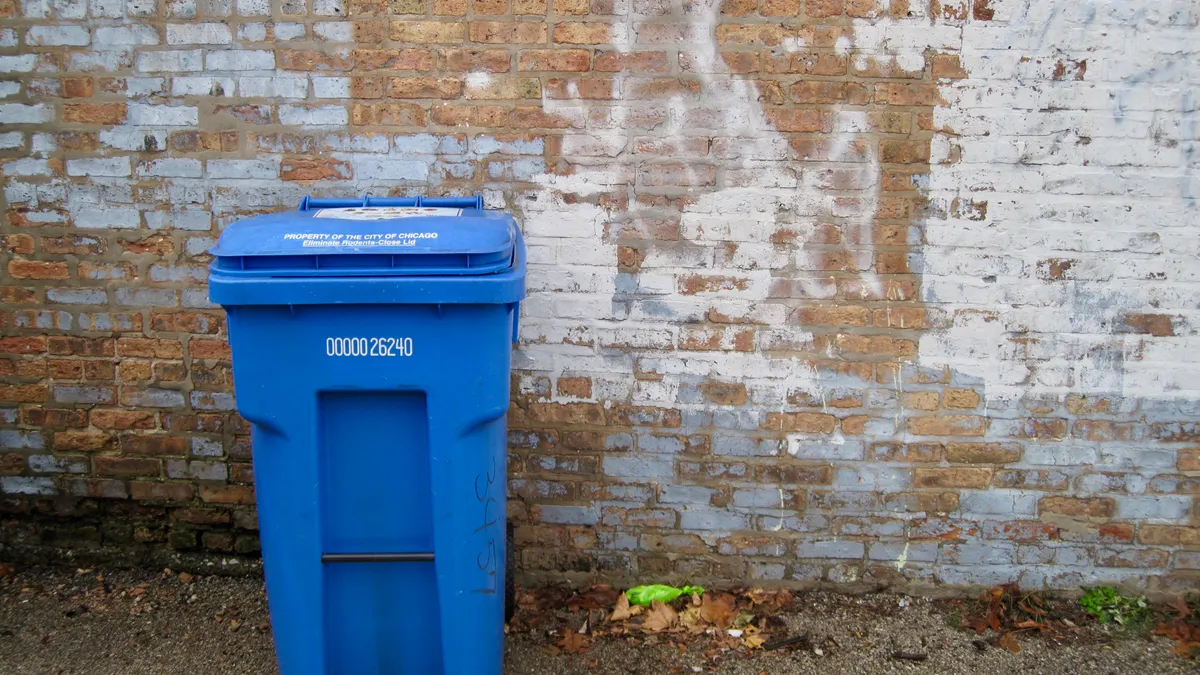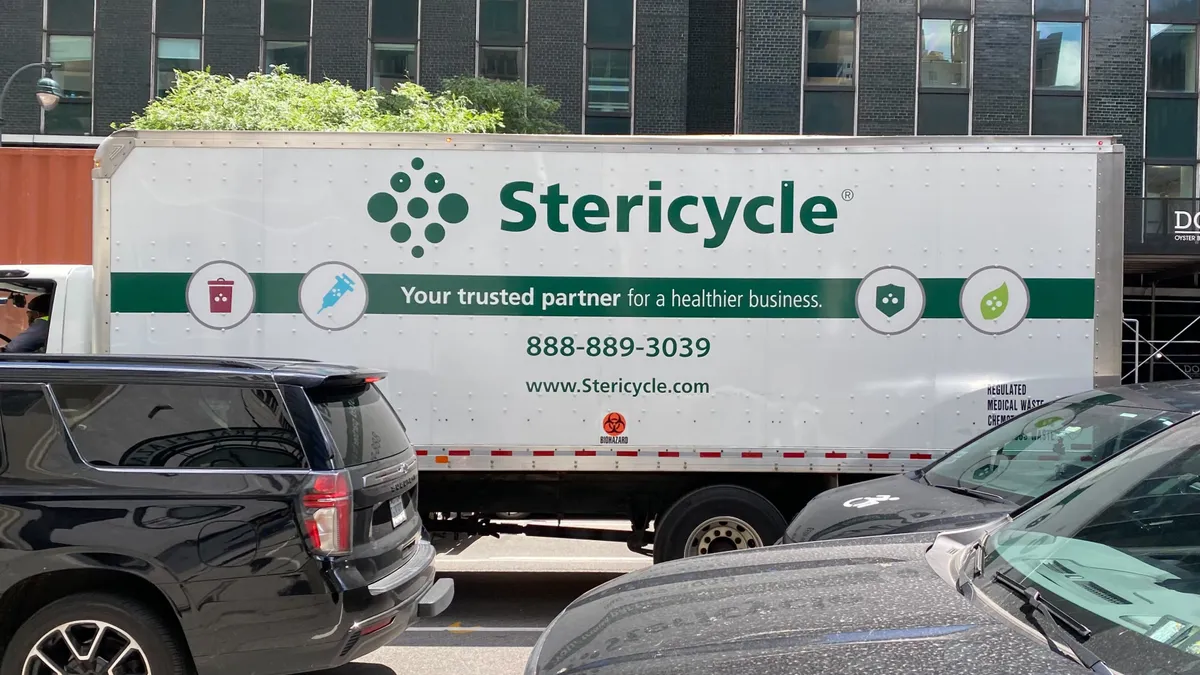Chicago leaders are putting the city's waste management practices under a microscope following years of lagging recycling rates. Earlier this year, the Department of Streets and Sanitation (DSS) announced it will launch a waste management study, and two aldermen are calling for public hearings examining different aspects of the recycling system.
DSS is not saying much about its study yet because the project is still in the planning phase, but it hopes for a deliverable late this year that will guide overall system improvements and future recycling contracts. Chicago's collection and processing contracts, which have been extended several times without going out to bid, are set to expire again this summer.
A main goal for the DSS study is to find ways to boost the city’s recycling rate — based on material collected in residential blue bins — which was 8.8% in 2018 and largely unchanged last year, according to the department.
"Number one is definitely an immediate improvement to our recycling program and the diversion numbers we’re seeing," DSS Deputy Commissioner of Policy & Sustainability Chris Sauve told Waste Dive in a February interview.
However, the study will consider the entire waste and recycling stream to determine what the city needs to work on and potential areas of opportunity — such as organics, for which Chicago does not currently have a collection program. DSS wants to "take into account all those different avenues to help reduce the waste stream overall," Sauve said.
The study will also consider global recycling changes and examine how other cities throughout the region manage their waste and recycling programs. Although more action is necessary just to begin the study, recycling reform advocates are encouraged by the initiative.
"The Chicago Recycling Coalition… is hopeful that this study will be a meaningful first step in a longer journey towards the city joining its more progressive peers and creating a plan that reflects a sustainable, holistic approach to municipal waste diversion and resource management," said Carter O'Brien, the nonprofit organization’s vice president.
In February, just a few weeks after Mayor Lori Lightfoot’s administration announced the waste management study, two aldermen filed separate resolutions calling for public hearings into Chicago’s recycling program. Ald. Raymond Lopez's resolution called for hearings into Waste Management’s acquisition of Advanced Disposal Services. Waste Management is one of the two private haulers that serve Chicago. The other is Sims Metal Management, via a partnership with Lakeshore Recycling Systems. Lopez's resolution says Waste Management would own 55% of the Chicago area’s landfills if the acquisition goes through, and that would give the company an unfair advantage.
Ald. Matthew Martin's resolution requests hearings examining the effectiveness of residential and commercial recycling, the effectiveness of yard waste services, options for composting food waste and methods other municipalities use for managing or reducing recyclable and compostable materials.
Martin told Waste Dive he proposed hearings as a step to advance real, sustainable actions following the Chicago City Council’s climate emergency declaration in February. DSS agrees that its work plays into the city’s greater goals. "Recycling is a key component in our efforts to make Chicago more sustainable," Sauve said.
Program evolution
Chicago began its Blue Cart recycling program on a limited scale in 2007, and in 2013 it expanded to all 600,000 households that DSS serves. It replaced the blue bag program that had existed for 13 years and was widely considered a failure due to low participation rates.
The city's recycling rate has dropped rather steadily since the cart program's inception, when it was nearly 17%. With recent years' rates falling into the single digits, Chicago — the nation’s third-largest city — trails other large cities. New York City, although covering a slightly different scope of households, reports that its recycling rate is about 18%.
A Chicago recycling ordinance went into effect in 2017 that increased fines for non-compliance, increased reporting requirements for waste haulers and required an annual waste diversion report from the city. Some sustainability advocates have criticized the city's level of transparency and accuracy with reporting its recycling data.
"Much bigger cities than Chicago are providing information more frequently. When you wait until the end of the year ... accuracy challenges will come at that stage of the game," O'Brien told Waste Dive.
A 2018 Better Government Association (BGA) investigation stirred up controversy when it revealed that a proportion of Chicago’s collected recyclables were being landfilled when carts are tagged as being contaminated. Plus, carts in areas served by Waste Management were tagged more frequently. Waste Management was implicated to be double dipping because it also owns a Chicago landfill, and therefore it was getting paid twice — once for collecting and then once for disposing the tagged recyclables.
"Six out of 10 blue carts are being thrown in the dump," O'Brien said. "We're paying Waste Management to do collection, knowing full well that they're not doing it."
In addition to Chicago’s low recycling rate, it has a high percentage of contaminated materials, which subsequently are landfilled. Waste Management’s percentage of contaminated materials varied from month to month over the past two years. In 2019, it ranged from December’s low of 47.3% to February’s high of 65.4%, for an overall annual average of 52.5%. That’s lower than 2018’s average contamination of 57.6%, with monthly numbers ranging from February’s low of 22% to June’s high of 75%.
City records show the contamination numbers for Sims Metal Recycling, which contracts with Lakeshore, were exactly the same every month in 2018 and 2019: 22%.
The city's documentation also notes that a fire closed Waste Management's Chicago MRF in 2018 so materials were re-routed to another Illinois facility and third-party facilities for processing.
"After the fire at our Chicago facility in late May 2018, we decided not to rebuild that facility since we already had plans for our future-style facility nearby. ... The new facility, located in Hodgkins, IL, has been ramping up material processing over the last few months and we expect to have that facility officially running by Q2 2020," Waste Management spokesperson Janette Micelli told Waste Dive via email.
DSS is not offering comment at this time about whether the hauling contracts will be extended again, renegotiated or terminated. It is also not specifying whether provisions would be made for a temporary extension from the time of the summer contract expirations until after the DSS report comes out, which would allow the department to use the study results to determine contract terms.
Advocates say repeatedly providing contract extensions, instead of at least re-examining them, is a sub-optimal way to conduct business. "It's like an afterthought when it comes to contracts," CRC’s O'Brien said. "Nobody else does it like this in a large city."
Last year, months before the DSS study was announced, Chicago’s Office of the Inspector General (OIG) launched an audit into the city’s recycling system. Specifically, it is examining whether DSS is enforcing high-density residential and commercial recycling requirements. Aldermen frequently report receiving complaints from citizens about missed pick-ups, and the audit is expected to provide more concrete data on that occurrence. The OIG told Waste Dive, prior to the COVID-19 outbreak, it anticipated releasing the final report in early spring.
The road ahead
The new OIG audit was one impetus for Martin's resolution requesting council hearings, as was the desire to take action on the climate emergency declaration. He also received constituent feedback asking for local leaders to tackle recycling issues.
Martin would like to see the city resurrect its Department of the Environment — which was notoriously scrapped more than eight years ago under then-Mayor Rahm Emanuel — or create an Office of Sustainability. Chicago is the outlier in the top 10 most populous U.S. cities to not contain one, or both, of these agencies.
"I believe strongly that environmental issues need to be on that top tier of not just issues that we're concerned about, but actions that we’re taking. I struggle to see a scenario in which that happens without adequately funding either a Department of the Environment or an Office of Sustainability within the mayor’s office," Martin said.
There are many possible permutations of what the council hearings could cover, from a broad look at recycling to more specific sessions pertaining to, for example, just hauler performance and contracts, he said.
"If we want to hold hearings this summer in advance of a decision around what we want to do with those contracts, I think that would be something that works," Martin said in February.
Moving forward, the Chicago Recycling Coalition recommends examining and fully vetting contracts with private haulers to ensure there are no conflicts of interest with landfill ownership. It also recommends implementing a statewide beverage container deposit law and requests greater transparency from the city around releasing and publicly posting its data.
"We expect better," O'Brien said. "It's a huge market, but somebody is capable of doing this properly. But that will never happen until there is more transparency."
CRC also encourages the implementation of organics collection pilot programs, noting that in addition to diverting more waste from landfill, this could reduce the amount of paper and cardboard contaminated by wet waste in recycling carts.
Investigating organics recycling opportunities is a key element of the DSS study, as well as the hearings Martin proposed. Martin, speaking in February, said he was heartened by the OIG and DSS audits, but he hopes the council chooses to move forward with hearings sooner, as opposed to tabling the issue until DSS releases its study. Enough coverage of Chicago’s recycling issues has emerged in the last couple of years to justify holding hearings immediately, and to fuel councilmembers' questions without waiting for the DSS report, he said.
"I strongly believe that waiting until the end of the year, if indeed that is the timeline we're working under for DSS to complete its audit, is much too late. We need to act quickly," he told Waste Dive.
DSS told Waste Dive it will share more details about its waste management study and what it hopes to achieve when it is further into the process. As of early March, the department had not experienced delays related to the city's coronavirus response. Similarly, Ald. Martin's office said it has not been informed of delays or cancellations due to coronavirus that would affect progress on the proposed city council subject matter hearings.
However, shortly thereafter Mayor Lightfoot postponed the March 18 council meeting until a yet-to-be-announced later date based on the latest coronavirus health guidance. As of this story's publication, it remains unclear if and how the coronavirus response will affect Chicago's ability to advance the waste and recycling program efforts that already were in motion.



















